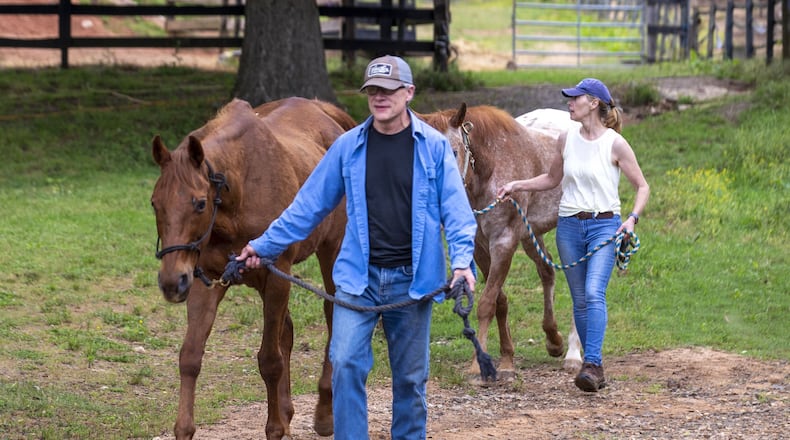Injured horses trapped in water during Hurricane Harvey, a goat barely alive that appeared to have polio, and an 800-pound pig were all abandoned, yet found a friend in a Cumming woman who has been devoted to rescuing horses and other farm animals since the 1980s.
Cheryl Flanagan is most known for rescuing horses that have been left behind by previous owners — she named her farm Save the Horses — but she has an open door for all types of animals and has rescued more than 1,000 since 1998.
Following Hurricane Harvey in 2017, the Cumming resident drove to Orange, Texas, found two horses with skin that appeared to have been scalded by the lashing water and brought the animals to her Georgia farm for treatment. More recently she and her farm volunteers nursed the sick goat back to health and carried the abandoned pig to an animal recovery mission in Florida.
The financial strain brought by the pandemic has put farm animals at a greater risk of being abandoned, Flanagan said. Private owners regularly ask her about places that will take in their animals at least for the short term until they can afford to care for them again, she said.
Many owners don’t have the money to feed their horses, Save the Horses board member, Kathy Sullivan said. Flanagan tries to provide feed in those circumstances, Sullivan added.
“One day I got nine calls from people wanting to give up their horses,” Flanagan said, adding that most the callers were in financial hardship. When owners have made up their minds to give up their horses, Flanagan tries to find them a new home or brings them to her own farm.
Save the Horses farm is currently home to 120 rescued horses. Flanagan said she started doing rescues in the 1980s while living in Florida. Horses that ran frequently at the racetrack were eventually abandoned or killed, she said. Whenever Flanagan was able, she and a friend would drive a trailer to find abandoned horses and take them home.
Save the Horses is the informal name for The Horse Rescue, Relief and Retirement Fund, a nonprofit fully run by volunteers and financially supported by donations and fundraisers.
Before the pandemic, a weekly rotation of volunteers would come to the farm to help clean horse stalls and care for the animals. There have been fewer volunteers in recent months but some still come to the farm, Flanagan said.
Lifeline Animal Project at Fulton and DeKalb County Animal Services frequently calls on Flanagan to rescue abandoned animals. According to Lifeline, county shelters took in 260 farm animals such as goats, chickens, pigs, horses, rabbits and guinea pigs in 2019.
“Cheryl has been huge help,” Karen Hirsch, Lifeline public relations director, said. “We see abused horses. One horse had been beaten in the eye and was blind. Volunteers would come to the farm and walk him around. Without her help, I don’t know what would have happened with the animals.”
Save the Horses recently took in a family of donkeys that had experienced very little human contact at their previous home. The father and son - Papi and Javi - of the donkey clan were adopted by the Russell Family, who live on a farm nearby with several animals. Small but tough, the donkeys protect other animals and property from coyotes, Maggie Russell said.
“We were just going to get one and I’m a huge advocate for trying to rescue animals,” she said. “They were cautious with us at first but once they learned that they could trust us, we fell in love.”
Save the Horses receives about $260,000 in donations annually, Flanagan said. The funds help to pay for the animal’s medical care, food and other supplies. About $48,000 was spent on hay last year, in addition to $28,000 on animal medical bills, she said.
In a normal year, Flanagan and the volunteers organize an annual horse show and fundraiser at Wills Park, an Easter Sunday event and pony parties that bring in a significant amount of funds. Those events were canceled this year. But Flanagan is optimistic when she looks back to the Great Recession in 2008 when a significant donation helped the organization to survive.
“We got down to almost nothing and someone said, ‘I would like to donate my vehicle,” Flanagan recalled. “It paid some of our bills and got us out of it. I’ve always been faithful in my belief that help will come.”
About the Author
Keep Reading
The Latest
Featured


